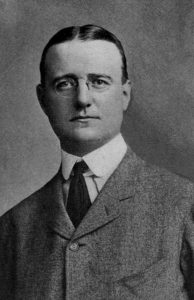Top Stories
Journalism Is Not Activism
The job of the newspaper is to comfort the afflicted and afflict the comfortable.


In 1893, Finley Peter Dunne, a journalist-turned-humorist at the Chicago Evening Post, introduced Martin J. Dooley to the people of Chicago. Mr. Dooley, as he was best known, was a thick-accented bartender from Ireland who owned a tavern in the Bridgeport neighborhood. Mr. Dooley became popular among Chicagoans for his rich satire of politics and society. Of course, Mr. Dooley wasn’t real. He was a fictional character created by Dunne. His work included countless sketches and wide-ranging commentary, but he may be best known for his biting one-liner on newspapers, since reclaimed by journalists as central to the profession’s creed: “The job of the newspaper is to comfort the afflicted and afflict the comfortable.”
The original quote is from Observations by Mr. Dooley, one of several works Dunne produced as the character, in which Dunne specifically satirizes the press’s penchant for trial-by-media. He presented Mr. Dooley through Irish dialect pieces, hence the diction, so the “affliction” quote below has been lightly edited for comprehension:
When anything was wrote about a man ’twas put this way: ‘We understand on good authority that…is on trial before Judge G. on an accusation of larceny. ‘But we don’t think it’s true.’ Nowadays, the larceny is discovered by a newspaper. The lead pipe is dug up your backyard by a reporter who knew it was there because he helped you bury it. A man knocks at your door early one mornin’ an’ you answer in your nighty. ‘In name of the law, I arrest you,’ says the man seizin’ you by the throat. ‘Who are you?’ you cry. ‘I’m a reporter for The Daily Slooth,’ says he. ‘Photographer, do your duty!” You’re hauled off in the circulation wagon to the newspaper office where a confession is ready for you to sign; you’re tried by a jury of the staff, sentenced by the editor-in-chief, and at ten o’clock Friday the fatal thrap is sprung by the fatal thrapper of the family journal. The newspaper does evrything for us. It runs the police force and the banks, commands the militia, controls the legislature, baptizes the young, marries the foolish, comforts the afflicted, afflicts the comfortable, buries the dead and roasts them aftherward.
That journalists of all stripes have touted a scathing critique of their profession and repurposed it as a mission statement is a textbook definition of irony that belongs on a Roman pedestal behind bulletproof glass in the Smithsonian. What is most vexing about the modern interpretation of Dunne’s quote is that its new meaning is implied to be synonymous with dispassionately seeking truth, which it necessarily is not.
More than afflicting the comfortable and comforting the afflicted, what requires consideration is who gets to determine who the afflicted and comforted are. The greater threat to the institutional press is less the lie set against the backdrop of reality, but rather the gradient of the myth that, as John F. Kennedy observed, provides “the comfort of opinion without the discomfort of thought.” It’s the dogged interrogation of claims that contradict one’s values, and a corresponding acceptance of those that reinforce them. It’s the heightened scrutiny of ideological rivals that makes ‘analysis’ read more like a rebuttal. It’s the routine conflation of disparate outcomes with disparate treatment. It’s the astroturf controversy cloaked in the dress of journalism that will ultimately lose the profession far more esteem than a lie that can be easily cleaved from the rest of an otherwise reputable herd.
This past spring, a debate erupted among journalists that reminded me of Dunne’s quote. During a segment on CNN’s Reliable Sources, host Brian Stelter asked Rebecca Schneid, an editor at the Marjory Stoneman Douglas High School student newspaper, whether she saw a difference between journalism and activism. Schneid responded:
I think that for me, the purpose of journalism is to raise the voices of people that maybe don’t have a voice…and so I think that in its own right journalism is a form of activism…Journalists can use the facts to describe an issue that plagues society…It’s journalists who present these facts and elevate the voices of the oppressed that allow for actual change to occur.
That exchange came around the same time Stelter, by his own on-air admission, neglected to call out multiple falsehoods made by MSD student activist David Hogg. Stelter also justified the disproportionate coverage in favor of gun control activists stating that it was reflective of the consensus of those students. Reasonable people can debate that justification. If, however, an editorial decision is taken to allot disproportionate coverage to any viewpoint then, as a journalist, Stelter should fully exercise the duties of his profession, or else admit that he is simply advancing a political agenda. It is disingenuous for Stelter, a media expert representing a network that has positioned itself as an arbiter of truth, to give a participant in a story both 95 percent of the media coverage while shielding them from scrutiny and accountability.
As for Schneid’s view, I’m sympathetic to her impulse but there is an overlooked distinction between journalism and activism. Journalism is a means-driven profession. The quality of a journalist’s final copy is determined by the integrity and care with which it is produced. This includes an adherence to a set of ethics and fairness guidelines and a drive to thoroughly research claims and accurately articulate a subject’s experiences and worldview.
Activism is ends-centric. Activists pursue a particular political objective and desired outcome. They do not have to abide by centralized codes of ethics, because their means are justified by the perceived nobility of their ends. Activist journalists begin with their own worldview and collect evidence that supports it. Schneid’s idea of elevating “the voices of the oppressed” is not the purpose of journalism. However, if journalists do their jobs fairly there is a high probability those voices will be a feature of any journalism worth its salt.
Every decent person who understands why America has a constitutionally protected press wants to see the press succeed. As the only unregulated private sector industry in America, the free press’s entire existence is based on afflicting the single most comforted institution throughout human history: centralized authority. Afflicting and comforting anyone else is secondary. The truth—and a genuine commitment to its pursuit—must take precedence, even when it runs contrary to the interests of whoever is deemed afflicted or comforted. Journalism humbles itself in finding truth in a complex world. Activism pursues its ends with righteous certainty. Journalism is the work of describing and understanding reality; activism is the work of refashioning it. Journalists act as impediments to the acquisition of power; activists pursue power.

There are two major challenges the press faces in answering questions about how it seeks truth, both of which are complicated by the economic transition we are amidst.
First is the business problem. Most digital media today are hyper-dependent on an ad-based business model that journalists recognize as the greatest challenge the industry faces, chiefly because of its meager pay and perverse incentive structure. Mainstream participation in social media and the ubiquity of smartphones have turned the Internet into a human appendage. Until recently, paralyzingly instant exposure to data—and ads—disincentivized the contemplation of alternative digital business models. This is especially the case when the content is algorithmically generated to keep people within their own political universes.
At the same time, an increasingly globalized and automated world has, by several measurements, enhanced the standard of living for billions of people but not for everyone. It wasn’t until 2016 that it occurred to Western political establishments that the cost-benefit calculus of this better world wasn’t an absolute gain but rather a trade-off. Some paid more for it than others, and this has given rise to authoritarian populism across the West; an ideology based on one form of identity-based blame-shifting or another whether on the basis of race, class, or now, gender.
The second problem is the political and cultural homogeneity of the media class. Americans have noticed. 64 percent believe the press favors Democrats over Republicans. The coverage of the 2016 campaign and its result proved that armchair conservative claims of the mythical ‘liberal media’ turned out to be real and getting worse. But the strongest evidence of a progressive media is the mere existence of what is explicitly referred to as ‘conservative media.’
While Fox News has been around for over 20 years, and outlets like National Review much longer, sites likes Breitbart, the Daily Wire, and the Daily Caller only launched within the last decade. They rapidly amassed loyal followings because they met a demand and tapped a market that most mainstream digital media had ignored, particularly compared to progressive, tech-savvy, venture capital-backed, conceptually indistinguishable digital outlets like Vox, Vice, Buzzfeed, Mic, Group Nine Media, and the entire gamut of the Gizmodo Media Group. The difference is that ‘conservative’ media is accurately labeled, whereas the same standards used to detect ideological bias are not applied to progressive or centrist outlets, which consider themselves to be neutral analysts by their own standards. No, a press dominated by progressive sensibilities aren’t colluding to tilt editorial in favor of Democrats. But, because the profession is comprised of the like-minded, the script frequently writes itself.
Of course reporters have biases, but that is barely the problem. Our life experiences that develop our blindspots are important because they lend urgency to covering particular stories. The goal shouldn’t be to remove bias (whatever that means) but to increase different variants of bias within newsrooms. When biases are not countered vigorously, facts get misrepresented, data gets cherry-picked, and ledes get buried. The first step to pursuing truth is breaking motivated reasoning and confirmation bias by institutionalizing disconfirmation through viewpoint diversity.
Journalists have a tough job. It’s not a glorious profession but, if done well, it can be a noble one. A fair share of criticism of the press fails to fully consider the circumstances—and even threats—under which journalists work. It is also true that the limitless discretion and right of a free press—and the lack of any organized institutional check on it—comes with an immense responsibility to continuously work to earn the public’s trust and never to expect it or take it for granted. The industry owes its existence to those who have held power to account in the past. In the present and future, it must continue to scrutinize those who acquire and consolidate power in order to impose their own will on free people, almost always in the name of the best of intentions.
Between an archaic business model and ideological divisions alone, the challenges the press faces today seem insurmountable. For now, readers and fair-minded journalists alike can renew their commitment to the primacy of truth without viewing the most inconvenient facts as existential threats to truth itself.






